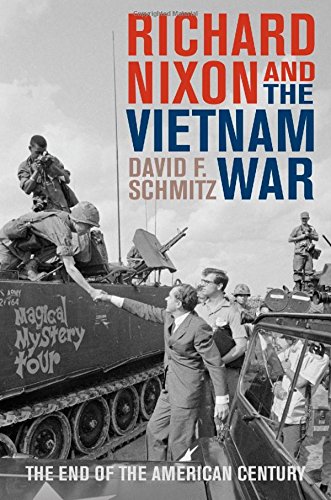
Richard Nixon and the Vietnam War
The End of the American Century
- اطلاعات
- نقد و بررسی
- دیدگاه کاربران
نقد و بررسی

April 28, 2014
Drawing on recently declassified documents and recordings from Nixon administration, historian Schmitz (The Tet Offensive) provides a revealing analysis of the 37th President's handling of the Vietnam War. Schmitz's findings illustrate that victory was imperative for Nixon, who didn't wish to become the only president to lose a war. With the objectives of containing communism, and preserving American credibility among the nations of the world, Nixon was willing to do anything to insure South Vietnam ended the war as an independent democracy, including carrying out covert missions and bombings, deceiving the American people, and even feigning insanity. Direct quotations from speeches, publications, and behind-closed-doors conversations are juxtaposed with the events that occurred at the time, providing a startling contrast that emphasizes just how often Nixon said one thing and did another. Schmitz concisely lays out Nixon's war strategy while pinpointing the controversial twists in the foreign policy from the years 1971 to 1973, and draws finely tuned conclusions about the larger impact on years to come. This strong, scholarly study will find its readership among both academics and American history buffs.

April 1, 2014
Citing declassified documents to bolster his premise, Schmitz (history, Whitman Coll.; The Tet Offensive: Politics, War, and Public Opinion) presents Richard Nixon as fighting not one but two failed Vietnam wars during his presidency. From 1969 to 1971, Nixon sought a military victory and a permanent noncommunist government in South Vietnam. From 1971 to 1973, he fought an increasingly desperate second war to achieve an honorable peace and to preserve his presidential reputation. He did so by means of bombings in Cambodia that were designed to scare North Vietnam into a treaty and by "Vietnamization" of the war to buy time before his reelection. He and Henry Kissinger also cooked up the "Madman Theory," aiming to make Nixon seem unstable to North Vietnam and its allies so that they wouldn't provoke him. The communist government waited to sign a treaty until after Nixon's troop reductions meant the U.S. presence could no longer support South Vietnam's unpopular Thieu government or its forces. Schmitz concludes that ultimately Nixon's war left a bitter legacy: a demoralized and divided United States, a long economic recession, and the collapse of the "American Century." VERDICT This concise overview of Nixon's Vietnam diplomacy draws on and updates Jeffrey Kimball's The Vietnam War Files. It is a good choice for graduate courses and will interest informed readers and Vietnam-era scholars.--Karl Helicher, Upper Merion Twp. Lib., King of Prussia, PA
Copyright 2014 Library Journal, LLC Used with permission.




دیدگاه کاربران